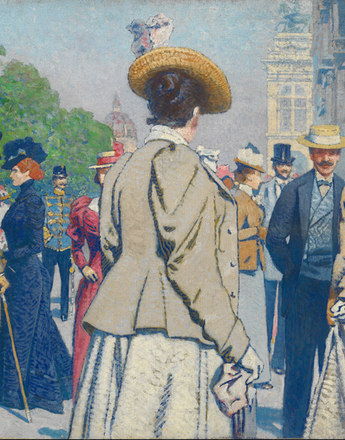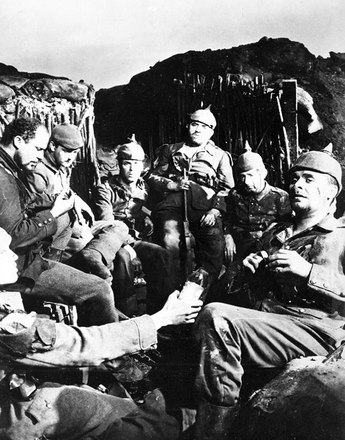‘The Austrian Society of Friends of Peace’– a brief episode?
-

Bertha von Suttner: “The next peace conference in Rome”, newspaper article from Die Neue Freie Presse, issue of 3 September 1891 (second part)
Copyright: ÖNB/ANNO
Partner: Austrian National Library -

The members of the peace conference in The Hague 1899, photograph
Copyright: Schloß Schönbrunn Kultur-und Betriebsges.m.b.H./Fotograf: Alexander E. Koller
The article by Bertha von Suttner appearing in early September 1891 in the Neue Freie Presse entitled “The next peace conference in Rome” marked "the birth of the Austrian Peace Movement".
According to the historian Laurie Cohen, von Suttner’s appeal in the Neue Freie Presse received 2,000 positive answers within a month and 2,000 krone in donations, enabling an Austrian delegation to take part in the third World Peace Conference in Rome. The appeal also led to the founding of the Austrian Society of Friends of Peace (ÖFG), which, according to its statutes, was a “purely humanitarian” society. Bertha von Suttner was appointed president and retained this position until her death on 21 June 1914.
The first members of the society were friends and acquaintances of Bertha and Arthur von Suttner, including the author Peter Rosegger, the journalist Leopold Katscher, Prince Alfred Graf von Wrede and Wilhelm Exner, as well as many politicians, literati and academics.
The main aim of the ÖFG was to raise public awareness of the need for lasting peace and the peaceful settlement of conflicts through an international court of arbitration. These aims were to be achieved above all through publications, public lectures and participation in international conferences. The main outlet of the ÖFG was the magazine Die Waffen nieder! Monatsschrift zur Förderung der Friedensidee, edited by Bertha von Suttner and published by Alfred H. Fried.
The Austrian Peace Society started out with 2,000 members, but it only grew slowly in the following years. By 1894, however, it was large enough for the first local groups to be founded in Trieste and Baden and, a year later, a Hungarian peace society in Budapest, Magyar Szent Korona Országainak Békeegyesülete (“Peace Society of the Lands of St. Stephan’s Crown”).
In spite of these developments, Bertha von Suttner soon realised that the ÖFG was not progressing as she had hoped. Membership remained far below her expectations, and interest and active support of the peace movement appeared to be more of a ‘flash in the pan’ than an eternal flame. In the years before the outbreak of the First World War the Austrian Peace Society was therefore merely a formal presence. Suttner’s disappointment at the failure to become involved in the international peace organisation prompted her in 1913 to consider resigning as president. She was also disappointed that, unlike the women’s or workers’ movements, the peace movement did not have popular appeal.
Bertha von Suttner died on 21 June 1914 during preparations for the planned 21st World Peace Conference. It was to have taken place in Vienna in September that year but did not do so because of the outbreak of war. An obituary appearing in Friedens-Warte stated: “Ever since we mortals have had a peace movement, ever since the fight for it flared up again at the turn of the century, this great movement was associated with her personality. They were so interlinked, the movement and the woman, that they were almost synonymous. Bertha von Suttner was the living symbol of the movement.”
Translation: Nick Somers
Cohen, Laurie R. (Hrsg.): „Gerade weil Sie eine Frau sind …“ Erkundungen über Bertha von Suttner, die unbekannte Friedensnobelpreisträgerin, Wien 2005
Gütermann, Christoph: Die Geschichte der österreichischen Friedensbewegung 1891-1985, in: Rauchensteiner, Manfried (Hrsg.): Überlegungen zum Frieden, Wien 1987, 13-132
Hamann, Brigitte: Bertha von Suttner – Ein Leben für den Frieden, München 2002
Kovács, Henriett: Die Friedensbewegung in Österreich-Ungarn an der Wende zum 20. Jahrhundert, Mitteleuropäische Studien II, herausgegeben von Binder, Dieter A./Kastner, Georg/Suppan, Arnold, Herne 2009
Quotes:
"the birth of the Austrian Peace Movement": Gütermann, Christoph: Die Geschichte der österreichischen Friedensbewegung 1891-1985, in: Rauchensteiner, Manfried (Hrsg.): Überlegungen zum Frieden, Wien 1987, 19
„[...] von Suttner’s appeal in the Neue Freie Presse …“: figures, quoted from: Cohen, Laurie R. (Hrsg.): „Gerade weil Sie eine Frau sind …“ Erkundungen über Bertha von Suttner, die unbekannte Friedensnobelpreisträgerin, Wien 2005, 59
„purely humanitarian“: quoted from: Cohen, Laurie R. (Hrsg.): „Gerade weil Sie eine Frau sind …“ Erkundungen über Bertha von Suttner, die unbekannte Friedensnobelpreisträgerin, Wien 2005, 60
„The first members of the society …“: Cohen, Laurie R. (Hrsg.): „Gerade weil Sie eine Frau sind …“ Erkundungen über Bertha von Suttner, die unbekannte Friedensnobelpreisträgerin, Wien 2005, 63
„The Austrian Peace Society started out …“: figures, quoted from: Cohen, Laurie R. (Hrsg.): „Gerade weil Sie eine Frau sind …“ Erkundungen über Bertha von Suttner, die unbekannte Friedensnobelpreisträgerin, Wien 2005, 66
„[...] first local groups to be founded …“: Gütermann, Christoph: Die Geschichte der österreichischen Friedensbewegung 1891-1985, in: Rauchensteiner, Manfried (Hrsg.): Überlegungen zum Frieden, Wien 1987, 31-32
„flash in the pan“: quoted from: Kovács, Henriett: Die Friedensbewegung in Österreich-Ungarn an der Wende zum 20. Jahrhundert, Mitteleuropäische Studien II, herausgegeben von Binder, Dieter A./Kastner, Georg/Suppan Arnold, Herne 2009, 89
„[…] in 1913 to consider resigning …“: Kovács, Henriett: Die Friedensbewegung in Österreich-Ungarn an der Wende zum 20. Jahrhundert, Mitteleuropäische Studien II, herausgegeben von Binder, Dieter A./Kastner, Georg/Suppan Arnold, Herne 2009, 89
„Ever since we mortals …“: quoted from: Alfred H. Fried (Hrsg.): Die Friedens-Warte für zwischenstaatliche Organisation, (1914), Jg. XVI., Heft 1, 242
-
Chapters
- “Lay down your arms” – Bertha von Suttner, the most prominent Austrian peace activist
- ‘The Austrian Society of Friends of Peace’– a brief episode?
- Alfred H. Fried and the peace movement during the war – censorship and derision
- ‘The League of Austrian Women’s Associations’ and the end of peace activities
- The Hague or the “betrayal” of the warring nation
- ‘… and tomorrow we will start cheerily canvassing for peace.’
- Peace and social issues
- The idea of the ‘peace-loving woman’?
- Peace and the Church – Thou shalt not kill!
- Peace and language – peace and the Esperanto movement
- Para Pacem – an Austrian peace movement with a difference
- Individual peace initiatives – Julius Meinl and Heinrich Lammasch
- ‘… surely this war must end some time?!’







